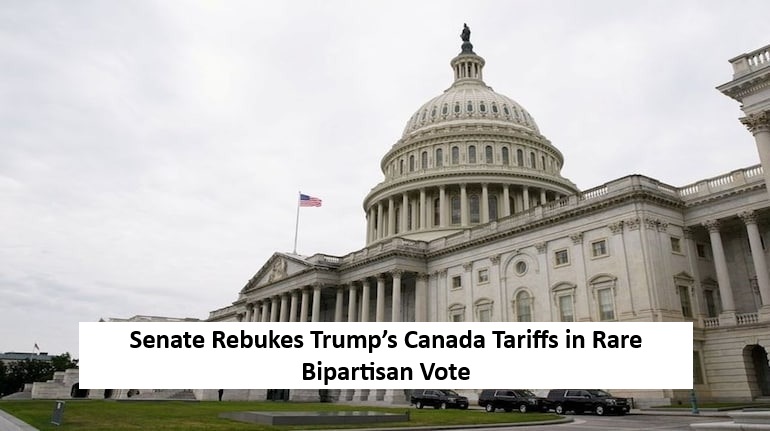
The U.S. Senate passed a resolution on Wednesday to block President Donald Trump’s 25% tariffs on Canadian goods, with 51 senators voting in favor and 48 against. The decision marked a rare bipartisan rebuke of the president’s trade authority, with four Republican senators joining all Democrats.
The resolution, led by Sen. Tim Kaine (D-Va.), seeks to revoke Trump’s use of the International Emergency Economic Powers Act (IEEPA), a law historically reserved for significant threats, which he cited to justify the tariffs due to the fentanyl crisis.
Republicans Join Democrats in Challenging Tariff Authority
Republican Senators Rand Paul, Susan Collins, Lisa Murkowski, and Mitch McConnell sided with Democrats, arguing that Trump bypassed congressional authority.
"This is a tax, plain and simple, on the American people," said Sen. Rand Paul.
"You can’t simply declare an emergency and say, 'Well, the constitutional republic was great, but we’ve got an emergency.'"
Sen. Collins expressed concern about the economic impact on her home state of Maine, especially its lobster industry, which relies on Canadian processing and tourism.
Impact Likely Limited by House Opposition and Veto Power
The resolution now faces roadblocks in the House of Representatives, where Republican leadership has included procedural barriers to prevent its advancement. Even if it passed both chambers, Trump could veto the resolution, and current support falls short of the two-thirds majority needed to override it.
This mirrors a 2019 situation in which Congress attempted to block Trump’s border wall emergency declaration—an effort Trump ultimately vetoed.
Tariff Justification Questioned by Lawmakers and Data
Trump cited the fentanyl crisis as the rationale for the emergency declaration, claiming Canadian imports posed a national security threat. However, Customs and Border Protection data indicates most fentanyl enters the U.S. through the southern border, not from Canada.
Some Republicans, like Sen. John Thune, defended the president’s stance, arguing the crisis warranted action. Others, however, called the emergency declaration unjustified.
Trade Fallout and Political Tensions Grow
Trump criticized the dissenting Republicans on social media, labeling them “unbelievably disloyal.” Despite this, Collins and Murkowski said they received no direct pressure from the president to alter their votes.
The 25% tariffs, which began March 4, exclude energy and potash imports, which are subject to a 10% rate. Tariffs on autos and certain goods under the USMCA remain suspended until April 2.
House Democrats Prepare Next Move
Rep. Gregory Meeks (D-N.Y.) announced plans to introduce a privileged resolution in the House to challenge the emergency declaration. However, GOP leaders have taken steps to prevent it from reaching the floor.
Despite limited immediate effect, the Senate’s vote signals increasing dissatisfaction with Trump's unilateral trade decisions—even among Republicans.
Read More: Aramco Under Fire: Second Drone Attack in 48 Hours Rattles Global Oil Markets

 Share
Share_722031383_100x75.jpg)



